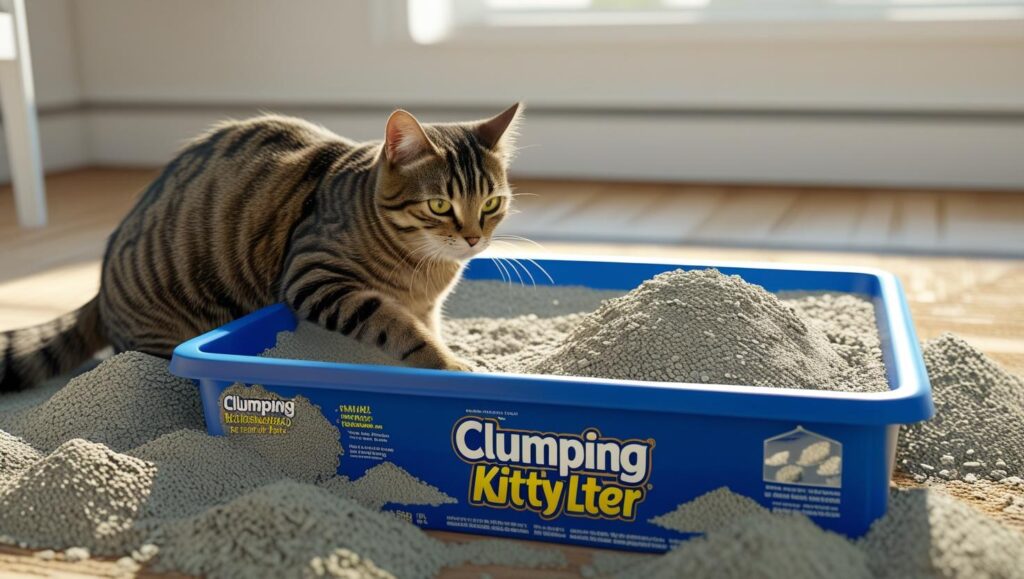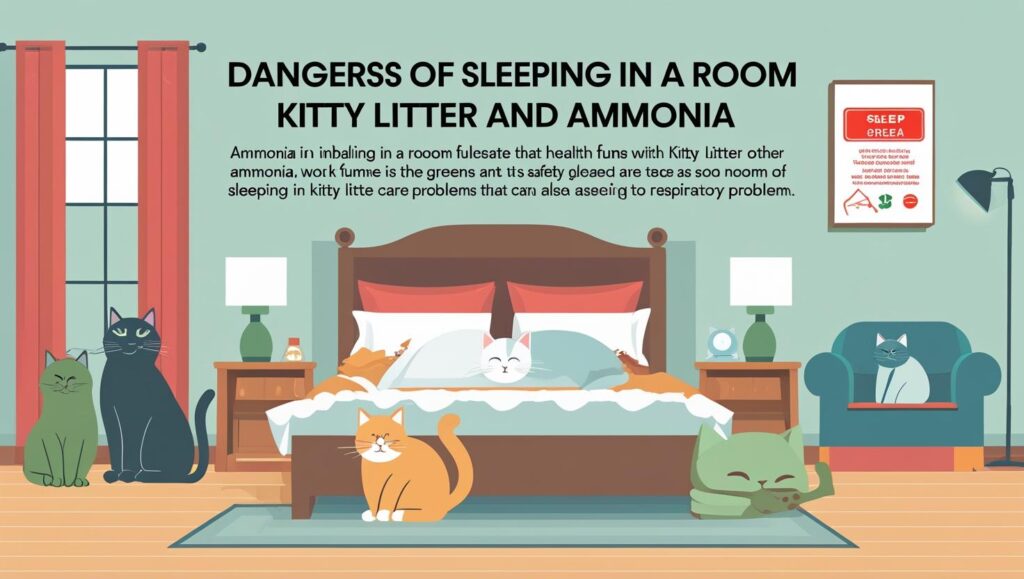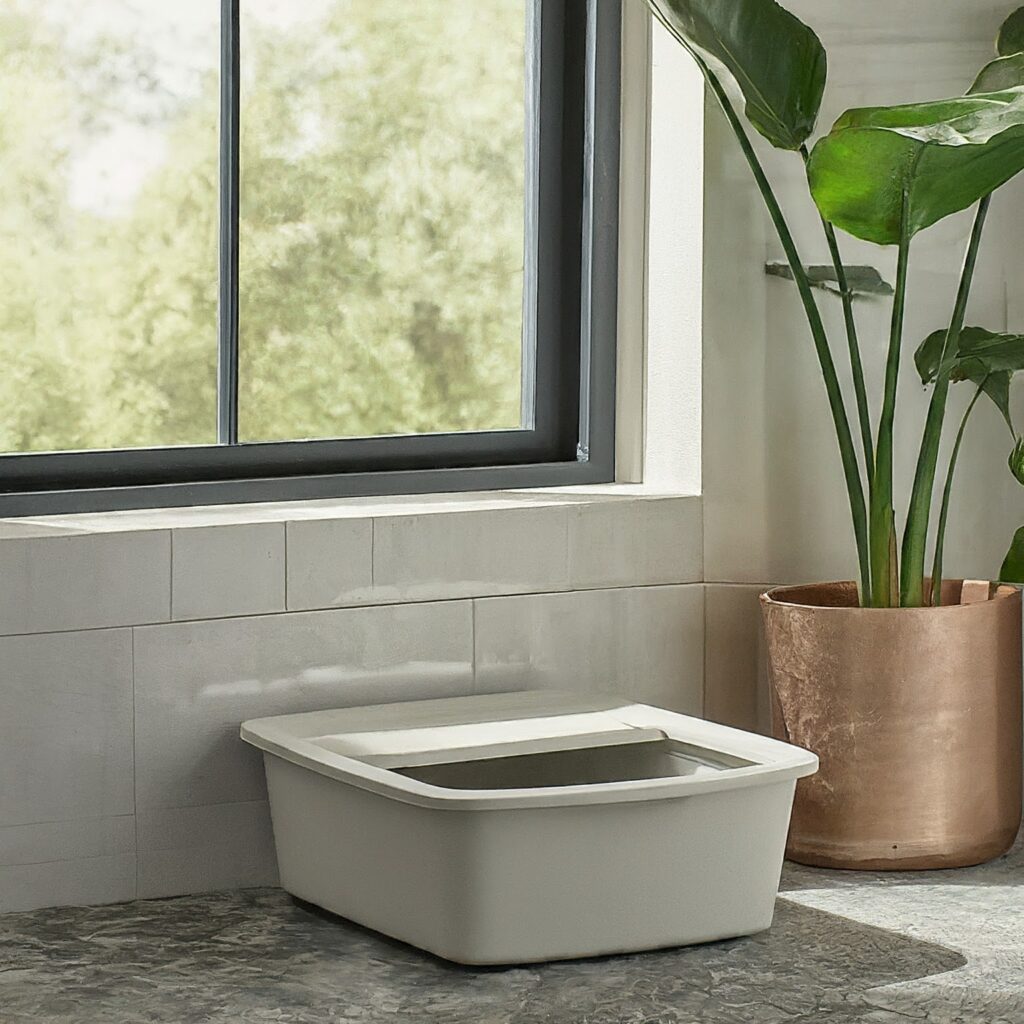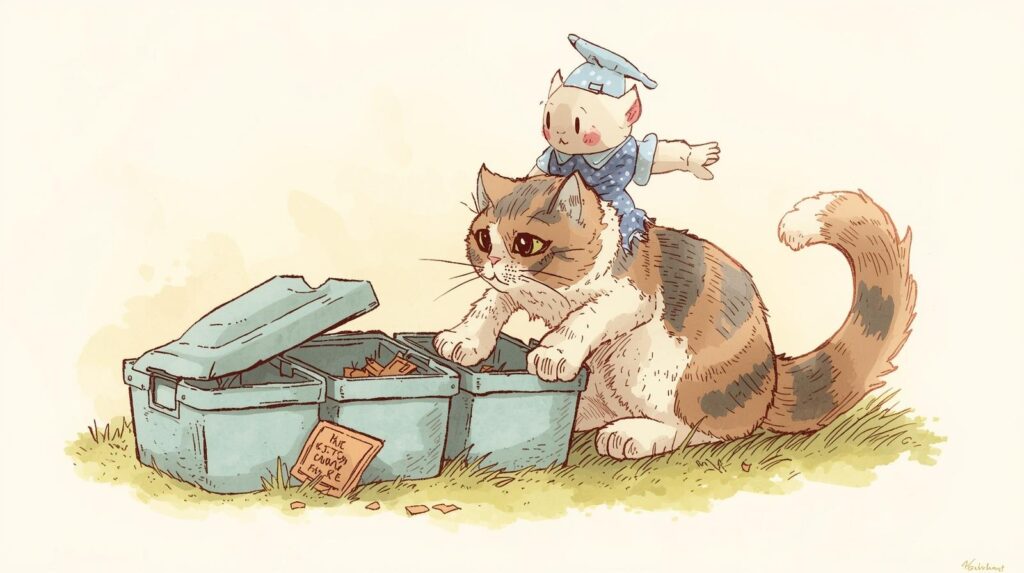
Is ammonia from cat litter toxic? Yes—and the truth is, most cat parents don’t realise just how dangerous kitty litter ammonia can be. It’s not just about a bad smell. That sharp, chemical-like odour from your litter box can lead to serious health risks for both you and your feline.
Here’s the direct answer: Kitty litter ammonia is toxic in high amounts. It can damage your cat’s lungs, eyes, and skin—and it could be affecting your indoor air, too. But don’t panic! This guide will help you stop the smell and protect your furry friend.
Table of Contents
What Is Kitty Litter Ammonia and Why Is It Toxic?
Kitty litter ammonia is the result of cat urine breaking down. When bacteria in the litter break down urea into ammonia gas, it causes that strong odour you smell. But it’s more than just unpleasant—it’s dangerous in enclosed spaces.
- Is ammonia from cat litter toxic?
Absolutely. Even low levels (25 ppm) can cause eye irritation, coughing, and breathing problems in cats and humans.
If your cat is exposed to kitty litter ammonia daily, it can lead to long-term health issues, especially in kittens, older cats, or cats with asthma.
How to Get Rid of Ammonia from Cat Litter Naturally
how to get rid of ammonia from cat litter without harsh chemicals? These natural solutions really work:
Baking Soda
- Yes! Can I put baking soda in my cat’s litter?
You can—and should. Use ¼ cup under the litter to absorb odors and neutralize ammonia. But avoid overuse.
Activated Charcoal
- Absorbs odor and traps ammonia gas. Buy carbon-infused litter or place charcoal pouches nearby.
Enzyme Cleaners
- These biological cleaners actually break down kitty litter ammonia at the source.
Vinegar + Water Spray
- After scooping, spray the box with a 50/50 mix. It changes the pH level to reduce ammonia buildup.
Green Tea Leaves
- Natural antibacterial properties reduce odor-causing bacteria in the litter.
Is Kitty Litter Ammonia Harmful to Cats and Humans?
Yes, kitty litter ammonia is harmful to both cats and humans. But let’s break it down—because the severity depends on concentration, exposure time, and how well-ventilated your home is.
Why Is Kitty Litter Ammonia Dangerous?
When your cat urinates, urea in the urine starts breaking down into ammonia gas. In poorly ventilated spaces or uncleaned litter boxes, ammonia builds up fast.
Ammonia is a corrosive gas, which means it irritates tissues and airways even at low levels. Once the level hits around 25 ppm (parts per million), it becomes dangerous.
Harmful Effects on Cats
Cats are especially vulnerable because:
- Their noses are only inches away from the litter box
- They groom themselves constantly, meaning exposure through skin, paws, and fur
- Small, enclosed litter areas trap ammonia and make it worse
Common symptoms of ammonia exposure in cats:
- Sneezing, coughing, or watery eyes
- Irritated skin or redness around the eyes and nose
- Pawing at the nose or avoiding the litter box
- Lethargy, fatigue, and lowered appetite
- Stress or anxiety related to strong odours in the litter box
Long-Term Risk:
Chronic exposure to kitty litter ammonia can lead to feline respiratory infections, chronic bronchitis, or worsen asthma in sensitive cats.
Harmful Effects on Humans
Humans, especially children, seniors, and those with asthma, are at risk too.
Common symptoms of ammonia exposure in humans:
- Burning eyes, sore throat, or sinus irritation
- Dry cough, shortness of breath
- Headaches, nausea, or dizziness
- Aggravation of asthma or lung conditions
- Skin irritation if handling soiled litter without protection
Is It Safe to Live or Sleep Near Cat Litter?
If you’re sleeping in a small room or studio apartment where your cat litter is nearby, this is a real concern.
- With poor air circulation, the room can become saturated with kitty litter ammonia, especially overnight when the windows are closed.
- This can disrupt sleep, cause headaches, and affect your breathing.
Pro Tip: Keep the litter box in a separate, ventilated area, use odour-locking litter, and scoop at least twice daily to prevent buildup.
What Science Says:
A study published in the Indoor Air Journal found that cat urine ammonia concentrations in homes with poor litter maintenance can exceed OSHA’s safe exposure limits, especially for pets who are closer to the ground.
Veterinary experts warn that even “low” exposure over time can suppress immune function in cats and make them prone to infections.
Is It Safe to Sleep in a Room with Kitty Litter and Ammonia?

Many small apartment or studio dwellers ask:
Is it safe to sleep in a room with cat litter?
If the box is not cleaned often, and kitty litter ammonia builds up, it can be dangerous.
Here’s what you can do:
- Scoop at least twice daily
- Use an air purifier near the cat litter
- Choose odour-neutralising litters
- Open windows and let in airflow
In well-ventilated spaces with good hygiene, yes, it’s generally safe—but only if you manage the kitty litter ammonia correctly.
Best Cleaning Methods: Will Ammonia Clean a Cat’s Pee?
No — Using ammonia to clean cat pee is a big mistake.
It might seem like a powerful cleaner due to its strong scent and disinfecting qualities, but ammonia will actually make the problem worse. Here’s why:
Why Ammonia Makes Cats Pee in the Same Spot Again
Cats have a strong sense of smell—up to 14 times stronger than humans. When you clean with ammonia-based products, you’re essentially reinforcing the smell of urine, because cat pee already contains ammonia.
So when you wipe up pee with an ammonia cleaner, your cat thinks:
This leads to:
- Repeated accidents in the same area
- Territory marking behaviour
- Ongoing odour and stress for you and your pet
That’s why kitty litter ammonia is already a problem, and adding more of it while cleaning just compounds the issue.
Why You Should NEVER Use Ammonia-Based Cleaners
Here’s what happens when you use ammonia products:
| Ammonia Effect | Result |
|---|---|
| Smells similar to cat urine | Encourages repeat peeing |
| Doesn’t fully remove uric acid crystals | Adds to the kitty litter ammonia buildup |
| Releases irritating fumes | Triggers coughing, sneezing, headaches |
| Adds to kitty litter ammonia buildup | Worsens indoor air quality |
So, What Works to Clean Cat Pee?
To fully eliminate urine stains and the strong smell caused by kitty litter ammonia, you need to break down uric acid, not just cover it up.
Here are proven, vet-recommended options:
Enzymatic Cleaners (Top Choice)
These are biological cleaners with active enzymes that literally eat the urine molecules, including the uric acid crystals that regular cleaners can’t remove.
- Breaks down both odour and stain at a molecular level
- Safe for floors, carpets, upholstery, and pet bedding
- Often recommended by vets and animal behaviourists
- Example products: Nature’s Miracle, Rocco & Roxie, Angry Orange
White Vinegar Solution
If you’re looking for a DIY or natural option, white vinegar is a safe and effective way to clean urine and reduce ammonia buildup.
- Mix a 1:1 ratio of white vinegar and water
- Spray directly onto the spot after blotting
- Let it sit for 5–10 minutes, then blot dry
- Optional: sprinkle baking soda after it dries for added odor control
Baking Soda (For Neutralising Odour)
After cleaning, sprinkle a light layer of baking soda to soak up any remaining smells.
- Let’s sit for 30 minutes to an hour
- Vacuum or wipe up afterwards
- Avoid using directly on wet urine—it won’t clean, only deodorise
Hydrogen Peroxide (Stain Remover for Hard Surfaces)
Use a 3% hydrogen peroxide solution with caution (not recommended for delicate fabrics or dark wood).
- Great for disinfecting and lightening urine stains
- Can break down bacteria that release ammonia
- Test on a small spot first to avoid bleaching
Deep-Cleaning Checklist to Eliminate Kitty Litter Ammonia Odour from Accidents
| Step | Purpose |
|---|---|
| Blot fresh urine | Absorb as much as possible immediately |
| Use enzyme or vinegar spray | Break down urine compounds |
| Let it sit | Prevent residue or mould |
| Rinse and dry | Absorb any leftover odour |
| Deodorize with baking soda | Deodorise with baking soda |
What to Avoid
- Bleach: Toxic if mixed with ammonia—produces dangerous chloramine gas
- Scented sprays: Only mask the smell, don’t remove the source
- Steam cleaners: Heat can set urine stains and odor deeper into the fibre
- Ammonia: For obvious reasons explained above!
Final Word on Cleaning Cat Pee
Using ammonia might make the mess look gone, but to your cat, the odor signal remains. And once a cat marks a spot, they’re likely to return unless it’s fully neutralised.
If you want to stop repeat accidents, protect your cat’s health, and eliminate kitty litter ammonia odours, stick to enzyme cleaners and natural neutralisers—not ammonia.
Should You Add Baking Soda to the Litter Box?
Definitely!
Can I put baking soda in my cat’s litter?
Yes—but in moderation. It’s one of the safest and most effective ways to fight kitty litter ammonia.
- Sprinkle it under the litter—not on top
- Don’t mix it directly with scented litters
- Avoid if your cat has sensitive paws
Also consider switching to eco-friendly cat litter like corn, wheat, or charcoal-based types that actively reduce ammonia naturally.
How to Stop Smelling Like Cat Pee
Cat pee isn’t just embarrassing—it’s frustrating and hard to remove, whether it’s your clothes, hands, carpet, or even your skin. The smell of cat urine clings because of uric acid crystals that don’t break down easily with regular cleaning. The secret to solving this stink? A science-backed approach using the right enzymatic cleaners, odour neutralisers, and daily hygiene habits.
Use Enzyme-Based Cleaners (Not Just Soap!)
Most people make the mistake of washing with regular soap or detergent. But that won’t remove the uric acid, which is the root cause of the lingering ammonia smell.
Tip: Use products like Nature’s Miracle, Rocco & Roxie, or Anti-Icky-Poo, which break down the enzymes in cat pee molecules completely.
Pre-Soak & Wash Contaminated Clothing Properly
If your clothes are affected, don’t just toss them in the washer.
Here’s what works best:
- Soak in white vinegar and water (1:3 ratio) for 30 minutes
- Then wash with baking soda and your regular detergent
- Air dry — heat from dryers can lock in odors!
Shower With Odour-Neutralising Body Wash
Sometimes the smell clings to your skin or hair, especially if you’ve handled kitty litter, ammonia or touched wet cat urine.
Here’s what to do:
- Wash with a charcoal-based or citrus body wash
- Add a few drops of tea tree oil or apple cider vinegar to your bath water (natural odour neutraliser)
- Use hand sanitiser on affected skin areas if you’re in a hurry
Deodorise Your Home and Soft Surfaces
You may think it’s you, but often the smell lingers in:
- Couch cushions
- Car seats
- Curtains
- Carpets
What to use:
- Odour-eliminating sprays (Febreze Pet, Zero Odor)
- Activated charcoal bags to absorb lingering scents
- Air purifiers with HEPA & carbon filters
Extra Tip: Open windows often! Kitty litter ammonia builds up in poorly ventilated homes.
Prevent the Smell Before It Starts
The best cure is prevention.
- Scoop your litter box twice daily
- Change cat litter every 5–7 days
- Use low-ammonia cat litter options (like plant-based or crystal litter)
- Add baking soda to your litter box to trap odors
Final Pro Tip: If you notice frequent or extra-strong cat urine odors, your cat may have a urinary tract infection or a kidney issue. Always consult your vet.
FAQs-Kitty Litter Ammonia
Is breathing in cat urine harmful?
Yes. Kitty litter ammonia from dried urine is toxic and can cause headaches, fatigue, and serious lung issues.
Can I clean with ammonia?
No. It worsens the problem and can mislead your cat into urinating in the wrong places.
Is it dangerous to live in a small apartment with cats?
Only if kitty litter ammonia is not managed well. Proper litter care, ventilation, and hygiene prevent problems.
What’s the best litter for odor control?
Silica, corn, charcoal-infused, and crystal litters all absorb moisture and ammonia effectively.
Further readings:
Wrapping Up:
Smelling like cat pee isn’t just annoying — it can affect your confidence, your clothes, and even how others feel around you. But now you know the real reason that smell sticks around: uric acid crystals and ammonia buildup that don’t go away with regular cleaning.
The good news? You don’t have to live with that smell anymore.
By using powerful enzyme-based cleaners, deodorizing your home with activated charcoal and HEPA air filters, and switching to low-odor cat litter, you can finally remove the cat pee smell permanently. Whether it’s on your clothes, your skin, your carpet, or in the air, there’s a solution that works fast and keeps the ammonia smell from coming back.
Remember:
- Always treat the source, not just the surface.
- Keep your litter box fresh and clean.
- Wash affected fabrics with baking soda, vinegar, and enzyme solutions.
- Ventilate your home regularly to avoid a cat urine smell in the house.
- If the odor is super strong or keeps coming back, check your cat’s health — there could be a UTI or kidney issue behind it.
You’re not alone—millions of pet parents deal with this. But now, you’ve got the tools to take back control and enjoy a fresh-smelling home again.
Final Tip:
Bookmark this guide or share it with a fellow cat parent who’s struggling with the same problem. A clean home doesn’t just feel better — it smells better too.



